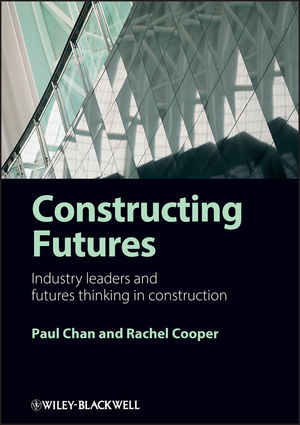Constructing Futures: Industry leaders and futures thinking in constructionISBN: 978-1-4051-5797-1
Hardcover
240 pages
December 2010, Wiley-Blackwell
 |
||||||
About the authors xi
Preface xiii
Part 1 Tracing the past 1
1 Introducing foresight in construction: exploring the missing link of personalising futures thinking 3
Chapter summary 3
Setting the ‘scene’ 4
Construction foresight studies 7
The ‘future’ agendas since the Second World War 7
Contemporary foresight reports at the turn of the century 9
Synthesis of critical trends and implications from the foresight reports 16
Critical appraisal of foresight studies 17
A note on the methodology 22
The structure of the book 24
Part 1: Tracing the past 24
Part 2: Eliciting the future 24
Part 3: Towards an afterthought 25
2 Influential people in the UK construction industry: what makes leadership in construction? 26
Chapter summary 26
Introduction 27
Leadership theories and application in construction 28
Development of leadership theories 28
Application of leadership theories in construction management research 30
Looking forward but learning from the past 30
So what makes a ‘leader’ in construction? 31
Critical antecedent: people 31
Critical antecedent: place 34
Critical antecedent: events 35
To be or not to be? The age-old question of nature and nurture 37
Closing thoughts 41
Part 2 Eliciting the future 45
3 Developing a sustainable future: theoretical and practical insights into sustainable development 47
Chapter summary 47
Introduction 49
Connecting people, profits and planet: the rise of the sustainability agenda 50
Interactions between people and places 51
Role of political leaders and infrastructure development 58
Industry response to the sustainable development agenda 68
Role of education and research 70
Summing up the thoughts of our leading figures 75
Sustainability: definitions and perspectives 78
Man-made capital: problems with an output-driven model 78
Human capital: the rhetoric versus reality of investing in people 81
Natural capital: consensus gained or paradise lost 86
Social capital: building trust and sustainable communities 94
The measurement problem: are efforts towards sustainable development doomed to fail? 100
Closing thoughts 102
4 Connecting up government, corporate and community stakeholders in governing the future of the construction industry 105
Chapter summary 105
Introduction 107
Governance of the industry: seeking an institutionally coordinated response to meet the challenges of the future 108
Think global act local 109
The changing role of government: relinquishing control to the private sector 115
Public–private interface 122
People and managing relationships in construction 128
Bringing interactions to the fore: exploring the intersections between government, corporate and community actors 140
Shifting perspectives of governance 142
Political governance: governance without government 143
Corporate governance: the rise of corporate social responsibility 145
Community governance: revisiting social capital 147
The need for joined-up governance 150
Governance in construction: the trends of privatisation and community engagement 155
The relationship between government and construction 155
Structure of the industry 161
Changing landscape of professionalism 165
Connecting political, corporate and community governance in construction: the importance of human relations 172
Closing thoughts 173
Part 3 Towards an afterthought 177
5 The last word: synthesising lessons learnt from the journeys... 179
Chapter summary 179
Introduction 180
Recap on previous chapters 181
Leadership as an emergent process: moving away from individualistic notions of leadership in construction 181
The missing social link of sustainable development 182
The aspirations of joined-up governance 182
Key conclusions 183
Futures thinking as emergent thinking 183
Disrupting boundaries: the age of hybrids 184
Tensions, ambiguities and paradoxes 185
Knowledge gaps to frame the research and practice agenda of the future 187
Epilogue 187
Appendix: Brief biographies of influential figures interviewed 189
Alan Ritchie 189
Bob White 189
Chris Blythe 190
Chris Luebkeman 190
George Ferguson 190
Guy Hazelhurst 190
Jon Rouse 191
Kenneth Yeang 191
Kevin McCloud 191
Nick Raynsford 192
Sandi Rhys Jones 192
Sir Michael Latham 192
Stef Stefanou 193
Tom Bloxham 193
Wayne Hemingway 194
Notes and references 195
Index 219



